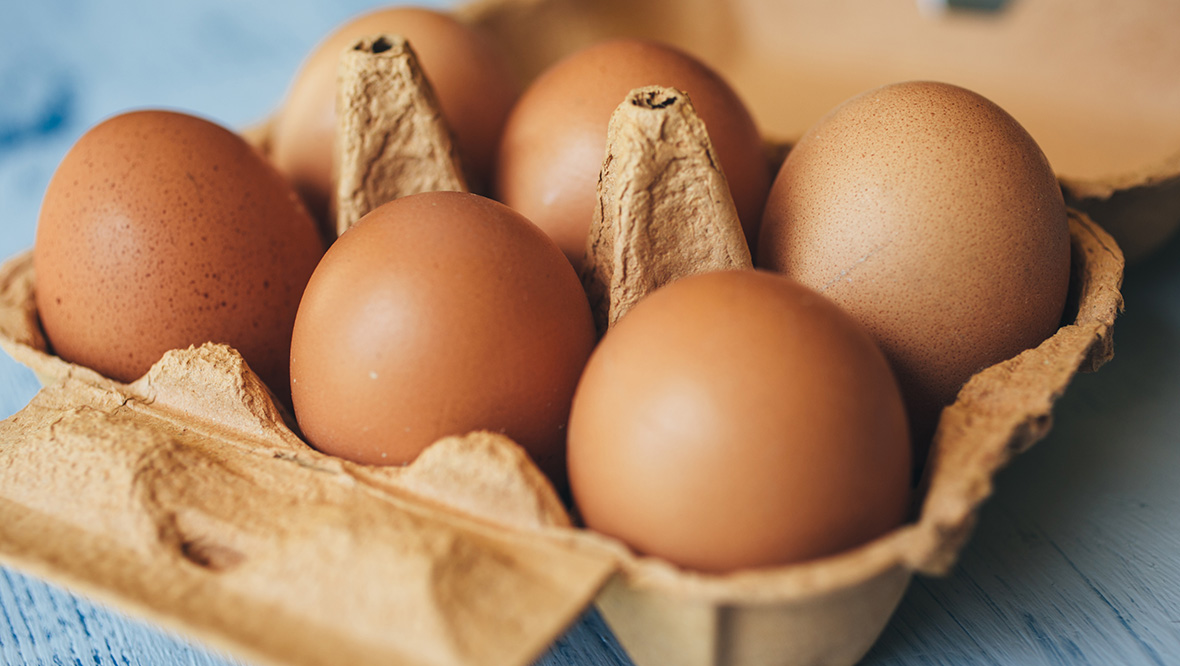One of the UK’s largest supermarkets is limiting the number of eggs that customers can buy due to supply issues.
Asda confirmed that people would only be permitted to buy two boxes – of any number of eggs – until further notice.
It comes as the UK has been facing its largest outbreak of bird flu, with more than 200 cases confirmed on commercial premises, smallholdings and in pet birds since October last year.
New measures to keep all poultry and captive birds indoors have been introduced in England – but those rules have not been implemented in Scotland.
The current shortage has been caused, in part, by the outbreak of avian flu, which has led to millions of birds being culled.
Other supermarkets across the county are monitoring the situation closely.
Morrisons said it currently had no major supply issues, while Tesco and Sainsbury’s also said they had good egg availability and had not introduced buying limits.
Andrew Opie, director of food and sustainability at the British Retail Consortium, said: “While avian flu has disrupted the supply of some egg ranges, retailers are experts at managing supply chains and are working hard to minimise impact on customers.
“Some stores have introduced temporary limits on the number of boxes customers can buy to ensure availability for everyone.”
Some farmers are also cutting back or halting egg production due to rising costs, with inflation hitting its highest level for 41 years in October.
Russia’s invasion of Ukraine has also driven up energy costs for farmers, according to the British Free Range Egg Producers Association (BFREPA).
Robert Gooch, CEO of the British Free Range Egg Producers Association, said: “Egg producers have been hit with huge hikes in production costs.
“Feeding hens is now at least 50% more expensive than it was, and energy prices have soared in the same way that consumers have seen their domestic bills rise. Spending on fuel has grown by 30%, while labour and packaging also costs more.
“Many of our members are losing money on every egg laid, and our data shows that even those who are making a small profit do not see a long-term future.
“Our survey of 163 free range producers this week showed that 33% had either reduced their flock sizes, paused production temporarily or left the industry all together.
“Fewer hens means fewer eggs and we warned in March that eggs could be in short supply by Christmas.
Robert Gooch, CEO of British Free Range Egg Producers Association
“Fewer hens means fewer eggs and we warned in March that eggs could be in short supply by Christmas.
“Egg supply naturally tightens at this time of year as businesses and individuals prepare for Christmas, which may be exacerbating the situation. On top of this, avian influenza has resulted in the culling of laying hens too.
“We need to see farmers paid a sustainable price to restore confidence and optimism to the sector.”
The rate of inflation across food and non-alcoholic drinks hit 16.4% in October – the highest since September 1977.
Families were hit by soaring costs of staple foods, such as milk, cheese and eggs, while there were also hefty hikes across everyday items such as sugar, tomato ketchup and jam.
The outbreak of avian influenza has exacerbated the problems facing the UK egg supply chain. But the National Farming Union (NFU) Scotland says retailers are partly to blame for the current situation.
Robert Thompson, chair of the poultry working group at NFU Scotland, said: “The threat of avian influenza hangs over the industry, causing huge concerns for all those who keep poultry.
“For those who have had an outbreak, it has been devastating, but its overall impact on production to date has been small. That makes retailer claims that AI (avian influenza) is behind the shortages completely disingenuous.
“The biggest driver behind falling egg production is a crisis of confidence. Retailers were informed in the spring that soaring costs in feed, packaging, and electricity needed an immediate increase in the prices paid to farmers if they were to continue to keep birds.”
NFU Scotland also dismissed retailer claims regarding avian influenza as a “red herring”. The union said the failure by some major retailers to recognise soaring costs faced by egg producers – by delivering a fair price back to the farm – was driving businesses to scale back production to reduce losses.
Mr Thompson said: “Shop shelf prices for eggs increased but the proportion of the price increase paid back to producers did not cover costs.
“Retailers were well warned by NFU Scotland, the Scottish Government and other industry bodies, those calls were largely ignored, and that warning is now coming home to roost.
“If they deliver a fair price back to egg producers, egg producers will respond and ensure that fresh, Scottish eggs will be freely available in stores.”
NFU Scotland also argues it is essential that commercial flocks are protected by being housed indoors.
But chief veterinary officer Sheila Voas said earlier this month the evidence in Scotland does not currently justify a housing order similar to the one introduced in England.
Follow STV News on WhatsApp
Scan the QR code on your mobile device for all the latest news from around the country


 iStock
iStock

























